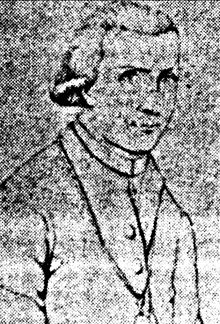Reverend Giammaria Ortes | |
|---|---|
 Giammaria Ortes | |
| Born | March 2, 1713 |
| Died | 22 July 1790 (aged 77) |
| Nationality | Italian |
| Occupations |
|
| Known for | having anticipated certain doctrines of Adam Smith and Thomas Robert Malthus |
| Title | abbot |
| Parent(s) | Giacomo Ortes Angela Ortes |
| Academic background | |
| Influences | |
| Academic work | |
| Discipline | Political economy, political philosophy |
| School or tradition | Classical economics |
| Influenced |
|
Abbé Giovanni Maria Ortes (2 March 1713 – 22 July 1790) was a Venetian composer, economist, mathematician, Camaldolese monk, and philosopher.[1] Ortes was one of the more renowned pre-Smithian Italian economists.[2] He is better known for his population predictions that preceded those of Malthus.
Ortes belonged to the Camaldolese monastic order. When he was thirty, however, he left the cloister and for the remainder of his life he was an abbé, dressed as a priest and fiercely loyal to the Church, but living with his family or friends and giving all of his time to scholarship and writing.
Ortes was probably the first person, according to Adam Ferguson, to use the term "economics" for the science in which he exercised a remarkable activity, particularly in his works Economia Nazionale (1774) and Riflessioni sulla popolazione (1790), which along with other of his works were reprinted in Pietro Custodi's anthology "Scrittori classici italiani di economia politica" (1802–16). He was opposed to mercantilism.
He anticipated certain doctrines of Adam Smith and Thomas Robert Malthus, especially the latter, as he felt that the population propagation, if it were allowed free rein, would take place in a geometric progression with a doubling every 30 years. These views were expounded in his Riflessioni sulla popolazione delle nazioni per rapporto all'economia nazionale (Reflections on the Population of Nations in respect to National Economy), published in 1790.[3]
- ^ a b c d Del Negro 2013.
- ^ Reinert, Sophus A., 'The Italian Tradition of Political Economy: Theories and Policies of Development in the Semi-Periphery of the Enlightenment', in Jomo KS and Erik S. R einert (eds.), The Origins of Development Economics: How Schools of Economic Thought Have Addressed Development, New Delhi: Tulika Books, 2005, p. 42.
- ^ Livi-Bacci, Massimo (2018). "Giammaria Ortes on Population: A Commentary". Population and Development Review. 44 (4): 839–842. doi:10.1111/padr.12221. ISSN 0098-7921. JSTOR 45174460. S2CID 149517702.